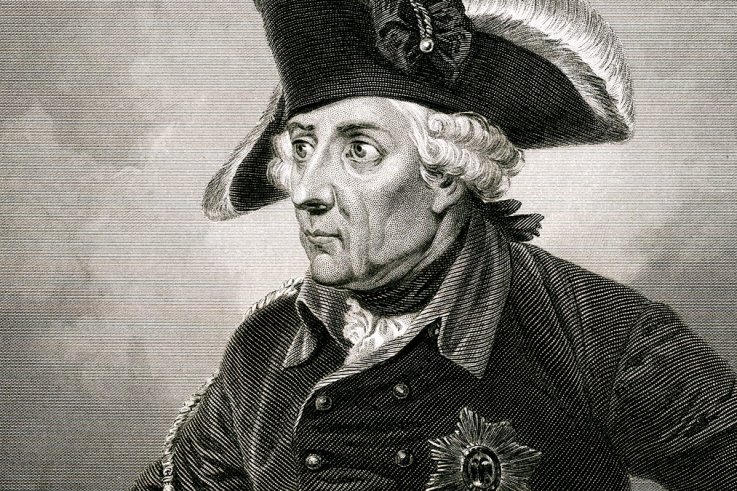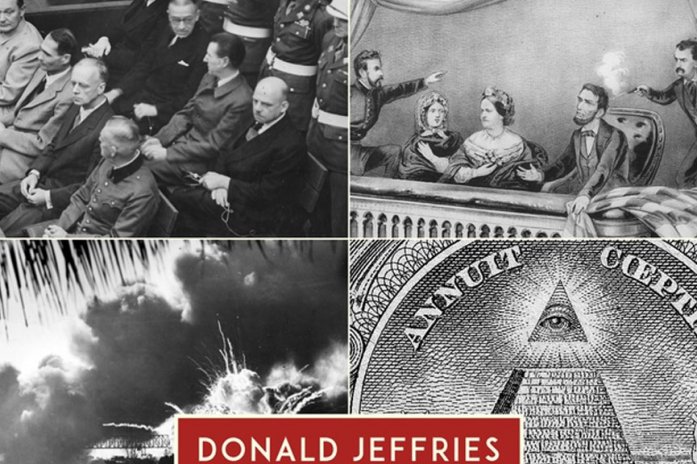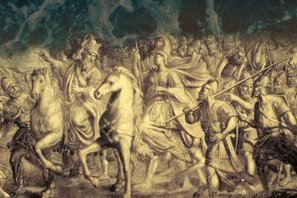In the Federal Republic of Germany, an ominous future looms, one that is literally “radiant.” However, this radiance has nothing to do with economic prosperity, improved quality of life, or the utopian multicultural society advocated by the so-called “elites.” Edgar Mayer and Thomas Mehner, authors of the German book “Zeitbombe Jonastal,” assert that the true meaning of this radiance points towards an impending nuclear catastrophe that could radically alter the...
In the annals of history, certain events have shaped the course of nations, and the true motivations behind them often lie beneath the surface. One such pivotal moment was America’s entry into World War I, a decision that had far-reaching consequences and was influenced by a complex interplay of interests. In this article, we delve into the revelations provided by Mr. Edward Griffin in his must read book regarding the...
In the annals of history, few monarchs have left as lasting an imprint on both the political and intellectual spheres as Frederick II, commonly known as Frederick the Great. Born in 1712, Frederick ascended to the throne of Prussia in 1740, embarking on a transformative reign that combined military prowess with an unparalleled commitment to philosophical discourse. The present English selection of Frederick’s writings aims to shift the focus from the overshadowed military and political exploits to the philosophical underpinnings […]...
Book Review: “Weapons of Mass Migration” by Kelly M. Greenhill In a world where traditional notions of conflict and coercion are evolving, Kelly M. Greenhill’s “Weapons of Mass Migration” provides a groundbreaking exploration of an unconventional yet highly effective form of coercion—engineered migration. As a seasoned reporter for Maier Files Chronicles, I find this book to be a captivating and thought-provoking examination of the intersection between geopolitics, human migration, and...
Otto Eduard Leopold von Bismarck was born at the manor-house of Schoenhausen, in the Mark of Brandenburg, on April 1, 1815. Just a month before, Napoleon had escaped from Elba; and, as the child lay in his cradle, the peasants of the village, who but half a year ago had returned from the great campaign in France, were once more called to arms. A few months passed by; again the King of...
Crimes and Cover-ups … The way history is presented to Americans, from the youngest schoolchildren to doctorate-level Ivy Leaguers, mirrors the way news is presented to the public. Much as it is difficult to find a single issue or event which the mainstream media has reported on accurately, it is just as difficult to find any historical event, or historical figure, portrayed honestly by establishment historians. We still see everyone from history professors to late-night comedians referring to any opponent […]...
Over a period of more than two centuries, the Pontic dynasty of northern Asia Minor evolved from modest beginnings into one of the most powerful states in the Greco- Roman world. Its founder, Mithridates I, was a refugee from the unforgiving and violent politics of the years after the death of Alexander the Great in 323 bc. The dynasty culminated in its last and most famous king, Mithridates VI the...
Zum ersten Mal wird in diesem Buch umfassend und in allen Einzelheiten erzählt und belegt, welch immense Werte im Verlauf von 7 Jahrzehn-ten an Sachvermögen, geistigem Eigentum und finanziellen Tributen aus Deutschland herausgezogen wurden: Wie das Land nach der Niederlage 1945 von den Siegermächten regelrecht aus-geplündert wurde und warum das Ausmaß der Reparationen bis heute krass unterschätzt wird. Was hinter dem Projekt der europäischen Integration steckt und wie dem Steuerzahler...
“Over Here!” The detectives were too tired to run, too cold. For two long days they had patrolled the banks near the Petrovsky Bridge. They waited and searched, saying little, occasionally jumping up and down for warmth and huddling around their braziers, watching divers searching among the river’s ice floes for the body. It had to be in the water: the bloodstains traced a grim path along the bridge, over the railing, and onto the snow below. A day passed […]...
This book should be seen as a nuanced representation of the relationship between folklore studies and a socialist-totalitarian state, based on some of the significant issues in the history of folklore studies in the three countries of Estonia, Latvia, and Lithuania, often referred to as “the Baltic countries.” This is not a complete and comprehensive history of folkloristics in the Baltic countries, nor is it an even representation of all....
By 1945 World War II had ended, but in Lithuania the war against the Soviet Union had only just begun. One of the bloodiest battles of the Lithuanian armed resistance, the battle of Kalniškės, was fought only days after “VE day”. Lithuanian farmers, school teachers, university professors, university and high school students, and a small number of remaining non-commissioned officers and lower ranking officers from independent Lithuania’s military, organized themselves...
Marta Hillers’s only consolation was that she had refused to put her name on the extraordinary manuscript in which she had so meticulously recounted the Soviet conquest of Berlin during the cold spring of 1945. It had been a time when her life—like that of tens of thousands of other Berlin women and girls—had become a nightmare of fear, hunger, and rape. Published for the first time in German in 1959, the book had brought to life one of the […]...













